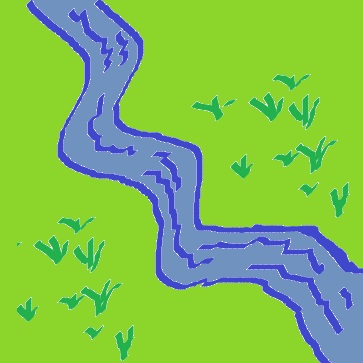Foundations of a Green Theology: Exile from the GardenGreen theology is a way of framing our faith, beliefs and actions to lead us to be good caretakers of the earth, respectful of natural resources, humans, animals and land. It is a recognition of the elements of our faith traditions that support us in leading lives that are conscientious and harmonious with the world we live in. One of the roots of this theology is an understanding of the biblical themes of creation, exile, separation and unity with God. Before reading this story of the garden of Eden, read this Nigerian myth. All over the world, "origins" stories grapple with the question of how death and suffering came into the world. In some accounts, it was the result of random events or the work of a capricious god. In others, like this Nigerian story, it was a natural result of choices made. Tortoises, Men, and Stones: A Nigerian Story: God created the tortoise, men and stones. Of each he created male and female. God gave life to the tortoises and men, but not to the stones. None could have children, and when they became old they did not die but became young again! The tortoise, however, wished to have children, and went to God. But God said: "I have given you life, but I have not given you permission to have children." But the tortoise came to God again to make the request, and finally God said: "You always come to ask for children. Do you realize that when the living have had several children they must die?" But the tortoise said: "Let me see my children and then die." Then God granted the wish. When man saw that the tortoise had children, he too wanted children. God warned man, as he had the tortoise, that he must die. But man also said: "Let me see my children and then die." That is how death and children came into the world. Only the stones didn't want to have children, so they never die! Source: http://exploringafrica.matrix.msu.edu/students/curriculum/m14/stories.php The Tree of Knowledge of Good and Evil: Notice in reading the well-known story in Genesis 2-3 that the forbidden tree was not an apple tree or a pomegranate tree or any of the other trees with edible fruit, but instead, it was the "tree of the knowledge of good and evil." As in the Nigerian story of the stones, tortoises and men, eating from the "tree of knowledge of good and evil" was perhaps an inevitable choice for humanity, and the consequences of the choice to eat from this tree reflect not an arbitrary outcome but the reality of human existence. Also notice that in the Garden of Eden story, the theme of exile is very important. The concept of living in exile is woven throughout the Old Testament, from the years of slavery in Egypt to the Babylonian exile.
Read: There are many passages throughout the Old Testament / Hebrew Scriptures that reflect this theme of exile, of the whole earth being separated from God: The earth mourns and withers, the world languishes and withers; the heavens languish together with the earth. - Isaiah 24:4 But these passages are answered by other passages that strongly affirm our inseparability from God:
Whither shall I go from thy Spirit? For many readers, it is significant that biblical scholars suggest that the first nine chapters of the book of Genesis were added to earlier manuscripts later, after the time of the Babylonian exile. Whether these manuscripts were adapted from earlier manuscripts or oral traditions is unknown. But the influence of these later experiences is clear. By the time of the exile, the image of the simplicity of life in an idyllic garden compared with the complexity of a world of wars and empires, was highlighted by historical experiences. The themes of the Garden of Eden story -- that troubles often flow from human choices; that the same human knowledge and intelligence that gives us good things also brings terrible evil things; and that God is present even in times of turmoil -- were especially important after the experiences of war and exile. Reflection: After the exile from the garden, God charged humans with being good stewards of the earth. Even after human choices create disastrous consequences, God wants people to be mindful of the choices made going forward. Our individual and collective choices matter. God is not a capricious god who would put the earth in exile. While human actions and choices can create a separation from God, we are never totally exiled from God's presence, and we are always encouraged and supported in making the next right choice. J.M.L. |
